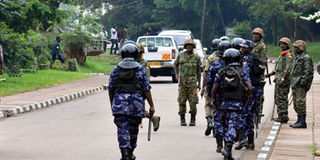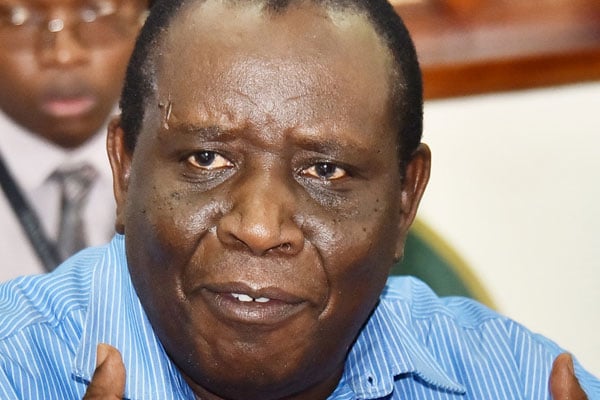Prime
Three nights of terror at Makerere

Crackdown. The police and army personnel jointly patrol Makerere University to stop students from striking against tuition increment on Thursday. PHOTO BY MICHAEL KAKUMIRIZI
What you need to know:
- By Friday evening, over 60 students were still detained at Wandegeya Police Station. Some of the students have been held beyond 48 hours since they were first arrested.
The angel of violence visited Makerere University on Thursday night.
The military had on two previous nights raided student halls at the university, since a student protest broke out on October 22, but Thursday was different.
The military police raid at Lumumba Hall started at around 6:45pm, according to a student who followed the events from their rooms.
The student, like many of his colleagues we spoke to for this story, requested that we don’t publish his details, citing fear of warning and suspension letters from the Vice Chancellor Prof Barnabas Nawangwe.
“All of a sudden we saw the military surround Lumumba Hall,” the student narrates, adding: “The military first fired three times. The main gate to the hall had been closed and students were using a small gate but I do not know how it was opened. They first beat up and arrested some students who were outside. They also beat up women engaged in stationery business and then ordered them to run. The military had specific information on the students they were looking for and started moving from door to door looking for them. Once they entered a room, they would destroy everything including cups and plates.”
READ:
The student continued: “They banged my door four or five times. I was hiding under the bed. Luckily for me they did not try to break the door like in other cases. They must have suspected that no one was inside. They were mostly beating their victims and allowing them to go. Only those they came for on purpose, they took. Most of the students whose property was destroyed have elected to go home. I think the aim was to break the morale of the students to stop protesting. Many have chosen to leave and go home while most of us are here but very scared.”
On the first night of the strike, October 22, the military raided University, Mitchell and Lumumba halls.
Several students were beaten at the respective halls of residence, while others were assaulted on their way from lectures.
On the second night, October 23, the situation was more relaxed.
The military only stormed Block B of Lumumba and broke into two rooms. They did not find anyone inside.
Unable to escape, several students living with disabilities were victims of the Thursday night raid at Lumumba Hall.
On Friday morning they attempted to protest demanding the release of their guide and another student with visual impairment, but their move was immediately quelled by the police.
By Friday evening, over 60 students were locked up in police cells, having been arrested on different days since the protest broke out on Tuesday.
Two of these are female and the rest male. The Thursday night raid left 10 admitted to the Makerere University Hospital, while Ms Siperia Mollie Saasiraabo, who led what she called a peaceful protest against the university’s policy of increasing school fees, is still admitted to Mengo Hospital, following an assault by unknown people.
Ms Saasiraabo, the Guild Representative Councilor (GRC) for the School of Psychology, was attacked on Wednesday night near Complex Hall. She and 14 others have since received suspension and warning letters for allegedly inciting violence from Prof Eria Hisali, the principal, College of Business and Management Sciences, and Mr Gordon Murangira, the personal assistant to the vice chancellor.
Prof Hisali is reportedly acting on behalf of the vice chancellor, as Prof Nawangwe is out of the country.
Missing
Student leaders at Mary Stuart Hall told this newspaper that at around 9am on Thursday morning, the military, backed by the police, surrounded their hall.
Tear gas aimed into their rooms followed and a number of students were picked up.
“We have tried to trace them but we have failed. We have been to Wandegeya police and the university police but they are not there,” one of the leaders at Mary Stuart Hall, whose names we have withheld on request, said.
Police on Thursday night brought a truck and threatened to transfer some of the arrested students to the remote Naggalama police, 36.6 kilometres away from Kampala City.
By Friday morning, however, all the arrested were still detained at Wandegeya Police station.
Some of the students have been held beyond 48 hours, since they were first arrested.
David Musiri, a student on the Bachelor of Commerce “external” programme of the university, has been one of the most of the discussed cases.
His father reportedly died of shock after receiving the news of his son’s brutal arrest.
By press time, Mr Musiri was still in custody at Jinja Road Police Station, despite efforts to get him released to mourn his father.
“I was at the police in the morning [Thursday] and the OC assured us that he was going to release him on a police bond. The LoP [Leader of Opposition in Parliament] was there and she was told the same,” said Bony Muwanguzi, the GRC for Makerere Law School.
He returned to the station of Friday morning but had not been successful in his pursuits by press time.
Detention beyond 48 hours
On July 9, Inspector General of Police Martins Okoth Ochola issued a circular to all police units directing the force to adhere to the provisions of the Human Rights (Enforcement Act 2019).
“The common human rights violations by police that have been documented over the years include, but are not limited to, detention of suspects beyond 48 hours, torture, denial of a right to a fair hearing ...” the circular reads in part.
He added: “Important to note is that responsible officers will now be required to personally incur the cost of compensation in the event of an award by court...”
Section 10 of the same holds public officers like police officers individually liable for violation of a person’s rights or freedoms committed either individually or in a group.
The law clearly states that individual officers shall pay a portion of the compensation as ordered by the court.
Asked about the events of the last three days, including the brutality by the soldiers, UPDF Spokesperson Brig Richard Karemire said: “If the students keep law and order, you may not see security forces at those halls of residence. However, where they don’t, security agencies will definitely come in to work together to enforce it. No doubt about this. There is no space for lawlessness.”

WHAT OTHERS say ABOUT MAKERERE CHAOS...
“I was beaten by the Military Police. Actually, I was from my place where I have my meals from in Nkrumah Hall. Some people were shouting and there was Military Police all over. They rounded us up and I was beaten badly all over my body with batons,” Student victim.
“I was in Lumumba Hall at night. After these guys (police) giving us teargas for two hours, they came and started breaking into our rooms. I don’t know what they were using. They were about five and could beat you in joints to weaken you. They broke our TVs, beds and they were beating us indiscriminately,” Student victim
“What happened to us during the strikes should not happen to anyone. No matter how bad we disagree, violence is not the solution. Let’s always leave room for dialogue. Student representatives must sharpen their arguments to counter the university’s,” Mr Jacob Oulanyah, Deputy Speaker of Parliament
“I will not step at Makerere today. I must rebel individually in protest against the vulgar, indespicable, horrendous mistreatment of students. What happened in Lumumba is reminiscent of Amin soldiers’ brutal treatment of students and lecturers. Anyone pretending that the situation is normal is like the proverbial ostrich - hiding his or her head under the sand. Imagine your son or daughter in a room. Military thugs forcifully open the door, pull him or her out amidst beatings. Your daughter being raped, molested or assaulted! Ladies and gentlemen, this militarisation of all institutions, including the Ivory Tower, the citadel of higher learning, must be condemned by all people of good conscience. Thus, I have decided, as a matter of conscience, to stay away from the ‘torture chambers’ of Makerere University today. My heart, body and soul are bleeding. I have no mental health to teach. Have a blessed day,” Prof Ben Twinomugisha, School of Law, Makerere University
“A section of Ugandan elites take a non-judgmental lenience towards the dysfunctional behavior of Makerere students who insist that society owes them education, an entitlement students in private universities don’t feel. What makes students in govt universities special? The problem of Makerere is a deeply entrenched culture of entitlement - that somehow those who work for or study at government institutions are entitled to cheap or free things. What makes those who study at Makerere more entitled to govt goodies than those at UCU, KIU or Nkozi? For those denouncing police handling of protests at Makerere: Chile, a democracy, 18 dead in anti-government protests. Ethiopia, Prime Minister Abiy has just won a Nobel Prize for peace: 5 dead in similar protests. What is the death toll at Makerere?” Mr Andrew M. Mwenda, Businessman and former journalist
List of some of the detained students
1. David Musiri (BCOM)
2. Evis Omoit (BCFPT)
3. Ronald Omurok (BSC ECON)
4. Andrew Batte (BCOm)
5. Ramadhan Seguya (BAED)
6. Yusuf Kagaba (BLUM)
7. Bright Ronald (BSC LUM)
8. Geoffrey Kaweesi (BAGR)
9. Charles Kamutono (BAED)
10. Charles Walibwa (BAED)
11. Edgar Ayebazibwe (BDUS)
12. Deogratias Amanya (BSAS)
13. Norman Kwesiga (BARI)
15. John walter Mandre (BSC.AGRIC)
16. Morris Bua (BSCA. AGRIC)
17. Gilbert Tumusiime( Industrial Chem)
18. Sowedi Kalule (BAED)
19. Jacob Oketch (BSC.AGRIC)
20. JohnMary Mulisimike (BCP)
21. Jethro Skiffle (BSSE)
22. Ishaq Kakaire (BARI)
23. Nusaniru Seguya (SSC)
26. Ronald Wasswa (CHESS)
27. Teyson Mutangala
28. Joshua William Mukisa (LAW)
29. Alfred Taremwa (BBA)
30. Joseph Mukamba (CIT)
31. Duncan Turyakira (MBCHB)
32. Martine Ahumuza (BAECON)
33. Alfred Talemwa (BBA)
34. Syson Mutangana (Psychology)
35. Ezra Byakutanga (BAECON)
36. Edward Balinda (BAED)
37. Moses Yiga (BASS)
38. Derrick Otim (BAEDUC)
39. David Blilyo (BIT)
40. Ambrose Matsiko (BASS)
41. Adam Wandudwe (BARI)
42. Emmanuel Olwit (BMAEL)
43. Laurent Izooba (WHM)
44. Bonny Eyen (BAED)
45. Humphrey Owuma (BASS)
46. Abdallah Turyatunga (MBCLB)
47. Evelyne Akot (BAED)




